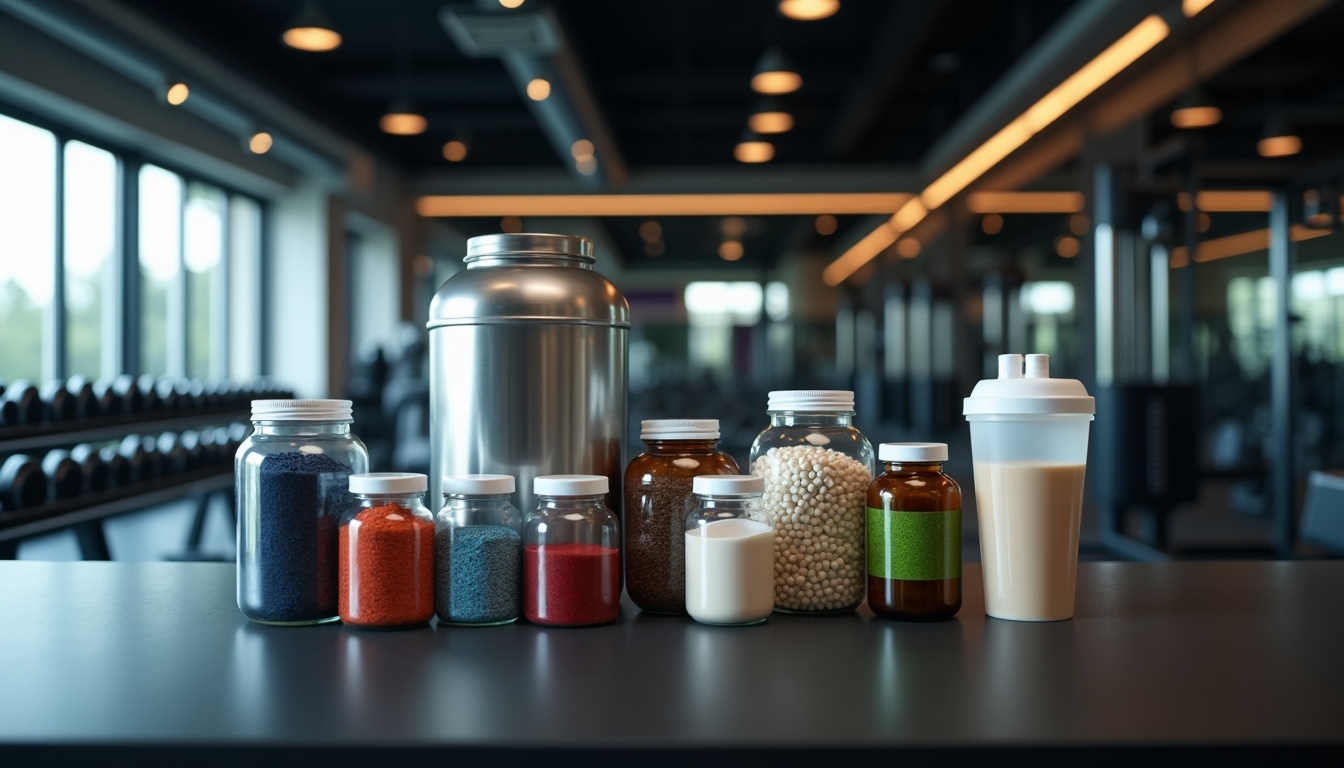The numbers are striking – 85.4% of gym users and instructors use dietary supplements regularly. Whey protein, vitamins, and BCAAs top the list of popular choices. These stats show how supplements have become a gym staple, yet many of us struggle to separate real benefits from marketing claims.
My years of supplement research and testing have taught me a lot about making the right choices. The timing makes a big difference – research proves that 20 grams of protein within 60 minutes after your workout gives you the best muscle recovery. Most people’s diets today contain more than 70% processed foods that create vitamin gaps. This means we need more than just protein to reach our fitness goals.
Let me walk you through the best supplements for gym success in 2025. You’ll learn everything about muscle-building compounds, performance boosters, and key vitamins. This detailed guide will show you exactly which supplements will give you the best results at the gym.
Essential Supplements for Muscle Growth in 2025

Image Source: Innerbody
Building muscle takes more than just regular training – your body needs the right nutritional support. The latest studies show that 73% of athletes use supplements specifically for muscle and bone health. Here’s a look at the most scientifically proven supplements for muscle growth in 2025.
Protein powders: Whey vs. plant-based options
Protein is the foundation of muscle development. Research shows you need 0.8-1.1 grams per pound of target body weight daily. Whole foods should be your main source of nutrition, but protein powders are a convenient way to supplement.
Whey protein leads the pack for muscle building because it:
- Has all nine essential amino acids, making it complete protein
- Packs high leucine content that triggers muscle protein synthesis
- Gets absorbed faster than other proteins
You’ll find whey in several forms with unique benefits:
- Whey concentrate: 40-90% protein with some fat and lactose, usually costs less
- Whey isolate: 90%+ protein, minimal fat and lactose, costs more
- Whey hydrolysate: Breaks down faster in your body
Plant-based options build muscle effectively when properly made. These proteins usually combine multiple sources (like pea, rice, and hemp) to create a complete amino acid profile. A newer study, published in 2021 by researchers found similar strength and muscle gains between plant-based and meat-based diets with matched protein intake at 1.6g/kg.
Creatine: The proven muscle builder
Creatine monohydrate is the most researched supplement for muscle development. Studies prove it can increase muscle mass by up to 7.2% and boost lifting capacity by up to 32%.
Your body uses creatine in multiple ways:
- Boosts phosphocreatine stores for ATP production during intense exercise
- Improves cell hydration that might stimulate muscle growth
- Lowers myostatin levels, a protein that stops muscle growth
The International Society of Sports Nutrition calls creatine “the world’s most effective supplement for adding muscle mass”. Research shows taking 3-5 grams daily works best.
BCAAs: Do they really work?
Branched-chain amino acids (leucine, isoleucine, and valine) have been gym favorites for years. Recent research shows mixed results about how well they work.
BCAAs might help you:
- Feel less sore after exercise, especially resistance training
- Fight exercise fatigue and perform better
- Keep your muscles from breaking down
The International Olympic Committee doesn’t list BCAAs among essential performance supplements. Research from King’s College London shows that BCAAs alone don’t work as well as supplements with all nine essential amino acids for muscle growth.
Emerging muscle-building supplements for 2025
Some promising supplements are showing great results for muscle development:
Beta-alanine helps your muscles work longer during intense training. Taking 2-5 grams daily improves endurance by fighting acid buildup in muscles.
HMB (Beta-Hydroxy Beta-Methylbutyrate) protects muscles from breakdown and helps muscle growth, especially for beginners. Taking 3 grams daily gives the best results.
Fish oil with omega-3 fatty acids helps muscles recover by reducing inflammation. Taking 1-2 grams of EPA/DHA daily with meals speeds up recovery and might help build more muscle.
The supplement industry keeps growing, and these science-backed options create the best foundation for your muscle-building toolkit in 2025.
Best Supplements for Fat Loss and Cutting

Image Source: Amazon UK
Getting lean while keeping your hard-earned muscle needs the right supplements along with a proper diet and training plan. Research shows specific supplements can boost fat burning, help control hunger, and improve body composition when you’re cutting calories.
Thermogenic pre-workouts explained
Thermogenic supplements raise your metabolism by making your body produce more heat, so you burn more calories throughout the day. Studies show these ingredients work in different ways:
- Caffeine: Triggers adrenaline release and boosts metabolism by about 0.1 calories per mg consumed over 24 hours
- Green tea extract: Contains EGCG that can raise metabolism by about 4% and boost fat burning by 16% for 24 hours
- Capsaicin: This compound from chili peppers can boost metabolism by about 50 calories daily and increase fat burning by 10% in the next 24 hours
Pre-workout formulas often combine these ingredients to boost energy before training. On top of that, research shows these pre-workouts can help with weight loss when you use them on days with intense or circuit training.
Protein timing for fat loss
Getting enough protein isn’t just about how much you eat—when you eat it matters for fat loss. Studies show spreading your protein intake through the day (about every 3-4 hours) helps build muscle and burn fat.
Starting your day with protein works best. High-protein breakfasts keep you feeling full and help you control calories better. Protein around your workouts also helps keep muscle while you’re cutting calories.
Your body needs 25-40 grams of protein per meal based on your size. This steady supply of amino acids helps muscle recovery and keeps your metabolism running high while keeping you full.
CLA and L-carnitine: Worth the investment?
CLA and L-carnitine are popular fat-loss supplements, but science isn’t fully convinced about both.
L-carnitine moves fatty acids into your cells’ powerhouses for energy. A 2021 review showed that 2 grams of L-carnitine daily for at least 2 weeks helped with weight loss in people who have type 2 diabetes. It might also help with insulin sensitivity if you have diabetes or struggle with weight.
CLA’s results aren’t as promising. While mice lose weight with high doses of CLA, human studies show tiny effects. What’s worse, research suggests that CLA’s weight loss might not be as healthy as other methods and could cause insulin problems.
Appetite suppressants: Benefits and risks
These supplements control hunger by changing how your body and brain handle appetite:
- They block or increase specific hormones and brain chemicals
- Make you feel full faster
- Change your brain’s hunger signals
Natural options include fiber like glucomannan that expands in your stomach, and 5-HTP that might boost serotonin to reduce cravings. Green tea extract and fenugreek can also help control appetite.
Research shows prescription appetite suppressants help people lose 5% or more of their starting weight. In spite of that, they come with risks. You might get constipation, headaches, sleep problems, or a faster heart rate. It’s vital to check with your doctor before trying any appetite suppressant—even natural ones.
Supplements for Improved Workout Performance

Image Source: Amazon.com
You just need strategic supplements beyond protein and vitamins to maximize your workout performance. The right performance boosters can substantially improve your training intensity, endurance, and results.
Caffeine and other energy boosters
Caffeine is the most prominent and researched performance booster with solid evidence supporting its benefits. Taking 200-300mg of caffeine 30-45 minutes before training can:
- Increase power output during resistance training
- Reduce perceived exertion during intense exercise
- Improve focus and mental alertness
- Boost exercise enjoyment
Caffeine supplements work best when you take them 30-60 minutes before your workout. Start with a lower dose to build your tolerance if you’re sensitive to stimulants. Many pre-workout formulas combine caffeine with taurine and tyrosine to boost their effects.
Beta-alanine for endurance
Beta-alanine has become a game-changer for endurance performance. This amino acid combines with histidine to create carnosine that acts as an intracellular pH buffer in your muscles.
Research shows 4-6g of beta-alanine daily for 2-4 weeks can increase muscle carnosine levels by up to 64%. Beta-alanine supplementation offers these benefits:
- Delays muscle acidosis during high-intensity exercise
- Improves performance in activities lasting 1-10 minutes
- Boosts calcium sensitivity in muscle fibers
- Reduces neuromuscular fatigue, especially in older adults
Beta-alanine works best during exercise lasting 60-240 seconds. Recent research shows it can improve 10km running performance too.
Nitric oxide boosters for better pumps
Nitric oxide helps dilate blood vessels and increases blood flow to muscles during exercise. Better circulation leads to improved nutrient delivery and waste removal.
L-citrulline proves more effective than L-arginine to boost nitric oxide production. Taking 8g of citrulline malate 60 minutes before training can:
- Boost aspects of strength and power
- Delay fatigue during high-volume resistance exercise
- Improve blood flow to active muscles
Citrulline malate reduces muscle soreness after exercise, making it valuable for recovery.
Electrolytes and hydration enhancers
Your electrolyte balance is vital for optimal performance. Intense exercise leads to sodium and potassium loss through sweat, causing dehydration, fatigue, and decreased performance.
Electrolyte supplements contain:
- Sodium: 20-345mg per serving
- Potassium: 65mg+ per serving
- Magnesium: 8mg+ per serving
- Calcium: 102mg+ per serving
Electrolyte drinks work better than water alone for workouts lasting over an hour, especially in hot conditions. Your body handles physical demands better when you take electrolytes before workouts. Taking them during exercise helps maintain hydration and prevents early fatigue.
Vitamins and Minerals Every Gym-Goer Needs
Micronutrients play a significant role in your gym performance, but people often overlook them while focusing on protein and pre-workouts. The research points to vitamins and minerals as the foundation of energy production, muscle growth, and recovery—key elements that drive athletic performance.
Vitamin D and testosterone connection
Your hormone levels can change a lot with vitamin D supplements. A study revealed that taking 83 μg (3,332 IU) of vitamin D daily for a year pushed total testosterone levels from 10.7 to 13.4 nmol/l. This happens because vitamin D receptors exist throughout the male reproductive tract. The testosterone boost helps muscle growth, strength gains, and overall performance—especially when you have limited sun exposure from indoor training.
Magnesium for muscle recovery
Your muscles relax naturally with magnesium as it blocks calcium uptake after intense contractions. Research shows that magnesium supplements protect against muscle damage during tough events like a 21-day cycling race. The mineral also activates vitamin D, which creates a powerful combination for recovery. Daily intake of 400 mg of magnesium improves muscle recovery and shields you from exercise-induced damage.
Zinc benefits for active individuals
Athletes with zinc deficiency often experience decreased endurance, major weight loss, and ongoing fatigue. Zinc supports your immune function, protein synthesis, and wound healing—vital processes for active people. The data shows that endurance athletes who eat high-carb, low-protein diets lack proper zinc intake in 90% of cases. You’ll find zinc in shellfish, meat, eggs, and dairy, so plant-based athletes might want to think about supplements.
Multivitamin recommendations for different training styles
Research suggests that no single vitamin stands above others for athletes. A balanced diet rich in lean proteins, whole grains, fruits, and vegetables gives you enough micronutrients for most training styles. All the same, specific training conditions might increase your needs—athletes who sweat heavily just need more electrolytes, while those cutting calories need extra iron support.
How to Choose Quality Supplements in 2025
The supplement market needs detective-like scrutiny to find quality products that work. The FDA barely regulates supplements compared to prescription drugs. You must figure out which supplements work and which don’t—a task that’s getting tougher in 2025.
Understanding supplement labels
Quality supplement selection starts with becoming skilled at reading labels. The Supplement Facts panel shows the ingredient list and amounts. Marketing claims don’t matter as much as matching dosages to scientific studies. Good supplements display active ingredients and additives clearly. The ingredients appear by weight order, with the biggest amounts listed first.
Third-party testing certifications
The FDA doesn’t check supplement contents, so third-party certification becomes your best quality guarantee. NSF International, United States Pharmacopeia (USP), ConsumerLab, and Banned Substances Control Group (BSCG) test supplements independently. These certifications prove products match their label claims exactly. NSF screens for 280 athletic-banned substances, which makes their seal valuable to serious athletes.
Avoiding proprietary blends
Proprietary blends raise red flags in supplement formulas. Companies say these protect their “secret formulas,” but we used them to hide exact ingredient amounts. Lab analysis helps competitors figure out formulas easily. These blends let companies use less expensive ingredients while keeping you guessing about amounts.
Budget-friendly vs. premium options
Quality doesn’t always associate with price in supplements. Both cheap and expensive options can work well with proper certifications. Premium supplements might offer better-absorbing forms. A budget iron supplement uses ferrous sulfate, while premium versions contain gentler iron bisglycinate. Certification and ingredient quality matter more than price.
Conclusion
Picking the right supplements greatly affects your gym success. Finding products that work among endless options can be tough for many fitness enthusiasts. My research and testing shows that you should start with proven basics like whey protein, creatine, and essential vitamins to build a strong foundation.
The science points to specific timing windows. You need protein within an hour after workouts and caffeine 30-45 minutes before training. Your body also needs vitamins and minerals daily. On top of that, third-party certifications help you find quality supplements you can trust.
Don’t chase every new trend. Focus on supplements backed by solid research. Of course, different things work for different people, so keep track of your results and adjust them as needed. Note that supplements help but can’t replace good nutrition and training.
The supplement market keeps changing. The basics we covered here remain vital to reach your fitness goals in 2025. Start with these proven options and stay consistent. Give your body time to respond before trying anything new.
FAQs
Q1. What are the most essential supplements for muscle growth in 2025? The most essential supplements for muscle growth in 2025 include whey protein powder, creatine monohydrate, and potentially plant-based protein options for those following a vegan diet. These supplements have strong scientific backing for supporting muscle development and recovery.
Q2. How can I choose high-quality supplements? To choose high-quality supplements, look for products with third-party testing certifications from organizations like NSF International or USP. Avoid proprietary blends, carefully read ingredient labels, and don’t assume that higher prices always mean better quality.
Q3. Are thermogenic pre-workouts effective for fat loss? Thermogenic pre-workouts can be effective for fat loss when used strategically. They typically contain ingredients like caffeine, green tea extract, and capsaicin, which can boost metabolism and increase calorie burn. However, they should be used in conjunction with a proper diet and exercise routine.
Q4. What supplements can improve workout performance? Supplements that can improve workout performance include caffeine for increased power and focus, beta-alanine for improved endurance, and citrulline malate for better blood flow and reduced fatigue. Proper hydration with electrolyte supplements is also crucial for maintaining performance during intense workouts.
Q5. How important are vitamins and minerals for gym-goers? Vitamins and minerals are crucial for gym-goers as they support energy production, muscle growth, and recovery. Key micronutrients include vitamin D for testosterone support, magnesium for muscle recovery, and zinc for immune function and protein synthesis. A well-balanced diet or a quality multivitamin can help ensure adequate intake.




